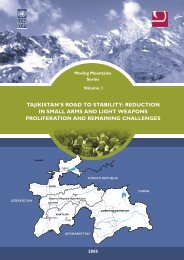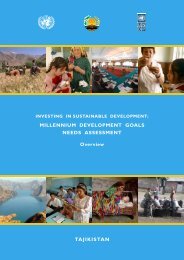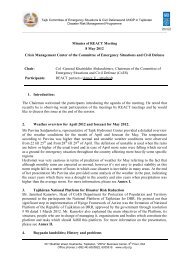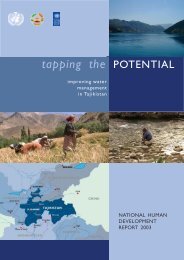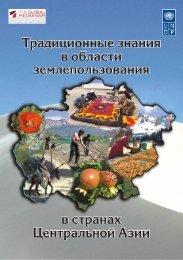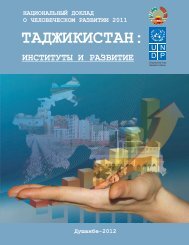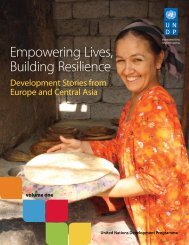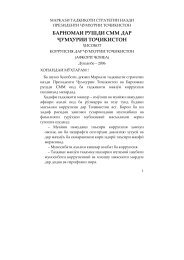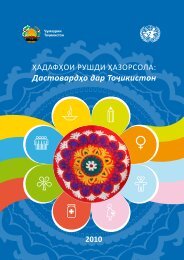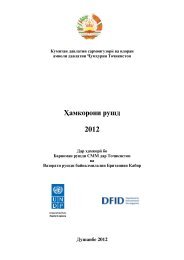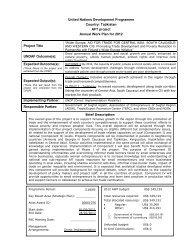Eng - UNDP in Tajikistan
Eng - UNDP in Tajikistan
Eng - UNDP in Tajikistan
You also want an ePaper? Increase the reach of your titles
YUMPU automatically turns print PDFs into web optimized ePapers that Google loves.
DEVELOPMENT PARTNER PROFILE<br />
the agricultural projects has been new private smallholders emerg<strong>in</strong>g from the conversion of the state enterprises. Support<strong>in</strong>g land reform,<br />
which only started after the peace treaty, with tra<strong>in</strong><strong>in</strong>g measures and legal advice for farmers has developed <strong>in</strong>to a further focal area. In 2005<br />
with the creation of MLF “Haqiq” cash micro-credits began to support beneficiaries <strong>in</strong> RRS <strong>in</strong> the field of cattle and poultry breed<strong>in</strong>g,<br />
beekeep<strong>in</strong>g, agriculture, and food process<strong>in</strong>g.<br />
From 1998, free-of-charge distribution of food was steadily reduced until it was term<strong>in</strong>ated <strong>in</strong> 2004. At the same time, community-supported<br />
resource management projects were launched. Based on target-group <strong>in</strong>itiatives, the runn<strong>in</strong>g of rehabilitation projects was supported via<br />
Food-for-Work (FfW) measures. Food for Work schemes were also term<strong>in</strong>ated <strong>in</strong> 2004, pay<strong>in</strong>g a grow<strong>in</strong>g attention to project contributions<br />
provided by the target group. In the last recent years, the rehabilitation projects have been comb<strong>in</strong>ed with projects for the development and<br />
support of <strong>in</strong>come-generat<strong>in</strong>g measures, especially designed for women, as well as disaster prevention approaches.<br />
Although consequently follow<strong>in</strong>g the concept of L<strong>in</strong>k<strong>in</strong>g Relief, Rehabilitation and Development (LRRD), the areas of emergency and<br />
disaster prevention cont<strong>in</strong>ue to rema<strong>in</strong> important for the work of Welthungerhilfe <strong>in</strong> <strong>Tajikistan</strong>. Ow<strong>in</strong>g to the particular vulnerability of<br />
<strong>Tajikistan</strong>’s mounta<strong>in</strong> regions to natural disasters, it is necessary to swiftly and flexibly respond to emergency situations. For example, <strong>in</strong> the<br />
2000/2001 project period, prompted by the devastat<strong>in</strong>g impact of the drought, free distribution of food was once aga<strong>in</strong> stepped up. Follow<strong>in</strong>g<br />
the heavy ra<strong>in</strong>s <strong>in</strong> July 2004, which resulted <strong>in</strong> the collapse of Dushanbe’s dr<strong>in</strong>k<strong>in</strong>g-water supply, 10,000 people were provided with clean<br />
dr<strong>in</strong>k<strong>in</strong>g water <strong>in</strong> <strong>Tajikistan</strong>’s capital via the employment of the Welthungerhilfe's dr<strong>in</strong>k<strong>in</strong>g-water purification plant. In July 2007<br />
Welthungerhilfe react with the rehabilitation of dr<strong>in</strong>k<strong>in</strong>g water systems and bridges to the earthquake <strong>in</strong> Rasht Valley.<br />
Future Programm<strong>in</strong>g Direction<br />
In co-ord<strong>in</strong>ation with the development targets of the <strong>in</strong>ternational community and the Republic of <strong>Tajikistan</strong>, Deutsche Welthungerhilfe e.V.<br />
is go<strong>in</strong>g to make a contribution with its projects to poverty reduction and the improvement of the Tajik population’s liv<strong>in</strong>g conditions <strong>in</strong> the<br />
future.<br />
The aim of Welthungerhilfe's activities over the next few years is to support rural communities <strong>in</strong> effectively us<strong>in</strong>g their resources to obta<strong>in</strong><br />
<strong>in</strong>creases <strong>in</strong> <strong>in</strong>come and susta<strong>in</strong>ably secure their livelihoods. Here, Welthungerhilfe builds on experience gathered with activities <strong>in</strong> <strong>Tajikistan</strong><br />
over the last ten years and is develop<strong>in</strong>g the project priorities further towards an <strong>in</strong>terl<strong>in</strong>k<strong>in</strong>g concept. At the centre of this concept stands the<br />
work at local level with a focus on resource management, with the latter compris<strong>in</strong>g both natural resources, <strong>in</strong>frastructure, and human capital.<br />
The content prioritised for work over the next few years is based on the wide range of experiences and acquired core competencies:<br />
• agriculture and food security;<br />
• resource management and disaster prevention;<br />
• promot<strong>in</strong>g <strong>in</strong>come-generat<strong>in</strong>g measures, process<strong>in</strong>g and market<strong>in</strong>g.<br />
One of Welthungerhilfe’s core competencies <strong>in</strong> <strong>Tajikistan</strong> is <strong>in</strong> the sector of agriculture. Welthungerhilfe is support<strong>in</strong>g the sett<strong>in</strong>g up of<br />
private farm enterprises that have emerged from the land reform over the last few years. Key activities here are provid<strong>in</strong>g seed and animals as<br />
well as mach<strong>in</strong>es, fertiliser and irrigation <strong>in</strong>frastructure. Promot<strong>in</strong>g knowledge and abilities via extension services, tra<strong>in</strong><strong>in</strong>g measures and the<br />
establishment of organisational structures as well as support<strong>in</strong>g land reform are further important areas of activity that are also go<strong>in</strong>g to play a<br />
crucial role over the next few years.<br />
The conservation and susta<strong>in</strong>able management of natural resources is a further area of crucial importance to <strong>Tajikistan</strong>’s rural population.<br />
Ow<strong>in</strong>g to the difficult environmental conditions and the <strong>in</strong>creas<strong>in</strong>g usage of natural resources caused by poverty follow<strong>in</strong>g the collapse of the<br />
Soviet Union, the situation <strong>in</strong> this area is go<strong>in</strong>g to become further aggravated. In the rural areas of <strong>Tajikistan</strong>, importance is above all attached<br />
to erosion protection and control, susta<strong>in</strong>able management of pasture land, effective management of exist<strong>in</strong>g water resources and measures to<br />
improve the use of exist<strong>in</strong>g energy reserves <strong>in</strong>clud<strong>in</strong>g measures to economise energy consumption.<br />
Disaster prevention is also go<strong>in</strong>g to be addressed <strong>in</strong> future programme plann<strong>in</strong>g. The situation regard<strong>in</strong>g the susta<strong>in</strong>able use of natural<br />
resources, which is conditioned by the landscape and is becom<strong>in</strong>g <strong>in</strong>creas<strong>in</strong>gly aggravated, makes it necessary for the local population to learn<br />
strategies to cope with natural disasters. Prepar<strong>in</strong>g the local population for disaster events and safeguard<strong>in</strong>g them from these events, also by<br />
work<strong>in</strong>g out crisis response plans and sett<strong>in</strong>g up early warn<strong>in</strong>g systems, as well as reduc<strong>in</strong>g the hazard potential are at the forefront of efforts<br />
<strong>in</strong> this respect.<br />
Reviv<strong>in</strong>g the economy and creat<strong>in</strong>g better access for the rural population to monetary <strong>in</strong>come is an area that can contribute to improv<strong>in</strong>g<br />
liv<strong>in</strong>g conditions <strong>in</strong> rural areas. Follow<strong>in</strong>g the collapse of the Soviet Union and the ensu<strong>in</strong>g civil war, the money economy above all came to<br />
an almost complete standstill <strong>in</strong> the mounta<strong>in</strong>ous regions of <strong>Tajikistan</strong>. The award of micro-credits, <strong>in</strong>formal vocational education, enhanc<strong>in</strong>g<br />
the quality and quantity of agricultural products, and the establishment of market<strong>in</strong>g cha<strong>in</strong>s provide significant impulses for the rehabilitation<br />
of function<strong>in</strong>g economic cycles <strong>in</strong> these regions.<br />
Ow<strong>in</strong>g to exposure to natural disasters and the cont<strong>in</strong>u<strong>in</strong>g tense security situation <strong>in</strong> the entire region, swift and flexible response to<br />
emergency situations is go<strong>in</strong>g to stay a necessity. However, giv<strong>in</strong>g that no major disasters occur, a medium-term goal is to withdraw from<br />
emergency relief altogether and <strong>in</strong>creas<strong>in</strong>gly offer local authorities and other <strong>in</strong>ternational organisations effective support <strong>in</strong> the event of<br />
disasters.<br />
From a methodical angle, it is above all community development and here, <strong>in</strong> particular, promot<strong>in</strong>g local organisational structures and<br />
capacity build<strong>in</strong>g, that plays a key role. The susta<strong>in</strong>ability of projects is to be atta<strong>in</strong>ed by support<strong>in</strong>g workable structures both at the level of<br />
the direct target group and at <strong>in</strong>stitutional and NGO level. Close co-operation with and the promotion of already exist<strong>in</strong>g structures is a<br />
desirable goal <strong>in</strong> this context.<br />
Welthungerhilfe is rely<strong>in</strong>g on the susta<strong>in</strong>able development of exist<strong>in</strong>g human resources as the key <strong>in</strong>strument of implementation. In future,<br />
project plann<strong>in</strong>g and implementation is go<strong>in</strong>g to be carried out <strong>in</strong> even closer co-operation with local organisational structures. In addition to<br />
mobilis<strong>in</strong>g the human resources of the direct target groups of the projects, promotion of project implement<strong>in</strong>g agencies is be<strong>in</strong>g stepped up <strong>in</strong><br />
the area of national NGOs and <strong>in</strong>stitutions (community, district departments, representations of m<strong>in</strong>istries).<br />
Welthungerhilfe’s regional priorities have been <strong>in</strong> the northern prov<strong>in</strong>ce of Sughd, which also comprises the Zeravshan Valley, as well as the<br />
central prov<strong>in</strong>ce with a focal po<strong>in</strong>t <strong>in</strong> the Karateg<strong>in</strong> area (Rasht Valley). On the basis of confidence developed on the part of the population<br />
and local expertise acquired <strong>in</strong> this context, Welthungerhilfe will cont<strong>in</strong>ue its work <strong>in</strong> these regions <strong>in</strong> the future. In addition, with the<br />
commencement of projects <strong>in</strong> Baljuvan, engagement is go<strong>in</strong>g to be extended to the prov<strong>in</strong>ce of Khatlon. Topics such as energy efficiency and<br />
the associated environmental, agricultural and health problems as well as compensat<strong>in</strong>g for the cont<strong>in</strong>u<strong>in</strong>g labour migration to the country’s<br />
North and to Russia are go<strong>in</strong>g to form priority areas of activity <strong>in</strong> Khatlon.<br />
Source: Aid Coord<strong>in</strong>ation and Project Monitor<strong>in</strong>g System Database<br />
© State Committee on Investments and State Property Management of the RT<br />
122




